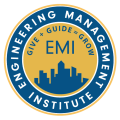You have the skills and ability right now to be ten times more successful in your engineering career. To make this change requires a strategy to focus your efforts and a commitment to incremental improvement. The strategy will be built on seven domains that you have complete control over.
Complete control to either improve or do nothing.
All you have to do is apply the right attitude, employ the right mindset, then get to work.
Engineering Career Success By Improvement
Please dispense any thoughts that success in business, education, or your engineering career comes in a blinding flash of brilliance or transformation. It just doesn’t happen like that. Learning and growth is an organic process that takes time. Developing your leadership skills or technical abilities requires daily practice, continuous learning, and experience from doing.
Achieving success in your engineering career first requires you to develop the skill of continuous improvement.
The Japanese have a word for continuous improvement: Kaizen. The concept was born in the manufacturing industry and is a pillar of LEAN and Six Sigma, recognized worldwide as an important pillar of an organization’s long-term competitive strategy. For you, it’s a mindset that when employed by you will enable you to achieve amazing success in your engineering career.
What is this mindset shift?
Focus on improving 1% per month. That’s it.
[widgets_on_pages id=”300 x 250 AdSense Banner”]
THE SEVEN KEY RESULT AREAS
Where do you focus your incremental improvement? Focus your energies on improving these seven areas to achieve amazing engineering career success:
1) Network Building. The time to build the network you need is now, not when you need it. Finding more and better qualified people to populate your network puts you in contact with the best people you need to get a new job, learn new skills, or create new business and engineering career opportunities. These people can become your mentors and perhaps your clients or future employer.
2) Technical and Professional Competence. Establishing your technical and professional competence comes via these four sub-areas: professional certifications, continuing education, experience, and formulating your own, signature way of executing your engineering work. Each of these sub-areas will define who you are as a “professional.” This holds true whether you attain the P.E. or not.
3) Relationship Selling. Building high levels of trust, rapport, and credibility with each person you work with or serve as a client (this includes your boss!) A person will not buy in to you until he or she is convinced you are acting in their best interests. This requires a servant leadership and servant selling mindset, something I’ll cover more in future articles.
4) Working Productively (and Smart). Designing and using a productivity system to manage your workflow is a must. It is the only way you will be able to accomplish your work and fit in everything else in your life. This is the single most important process you can have in place for ensuring your engineering career stays on vector and you remain fulfilled in life.
5) Managing the Project. Achieving leadership positions in your engineering career will require you to be skilled at managing a project effectively. This entails much more than monitoring and controlling scope, time, and cost. Productivity and workflow are important here, but so is effective communication and much more. Your situation may or may not require certification in project management, but at minimum you need to be skilled at applying a project management methodology.
6) Communicating Actively. Being actively engaged across the spectrum of communications: writing, speaking, presenting, and listening. This means mastering the skills of persuasion and influence so when you write something or give a presentation, other people listen. It also entails becoming very good at listening to others so you can figure out what they truly need.
7) Leading with Confidence. Knowing what your values are, what your vision is, and why you do what you do (your purpose) so you can lead effectively with confidence and strength.
[widgets_on_pages id=”300 x 250 AdSense Banner”]
Your Continuous Improvement Journey
Success in your engineering career and fulfillment in life only occurs by being actively engaged in continuous improvement in each of these seven areas. What does this look like? Well, if you make even a minor 1% improvement per month, you will have grown your skills and knowledge in each area by over 10% in a year. You can make these improvements through actions like reading this blog and others, listening to podcasts, being active in a professional organization, reading books on each of these areas, setting SMART goals or pursuing certifications or self-study in courses to fill knowledge gaps.
Each step you make is an investment in your future and your ability to deliver value to the world. The question is, when will you start?









